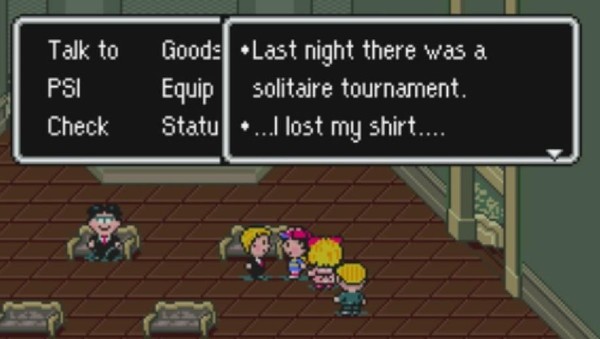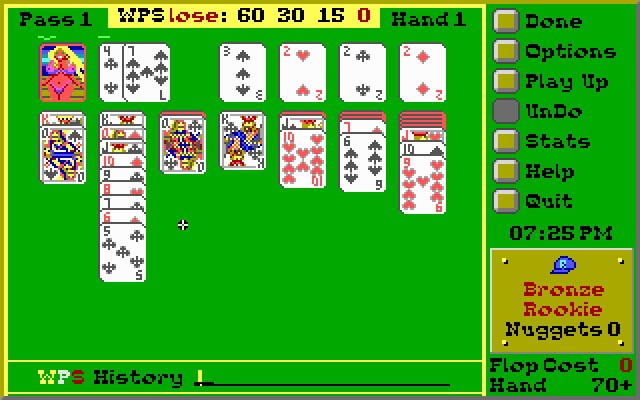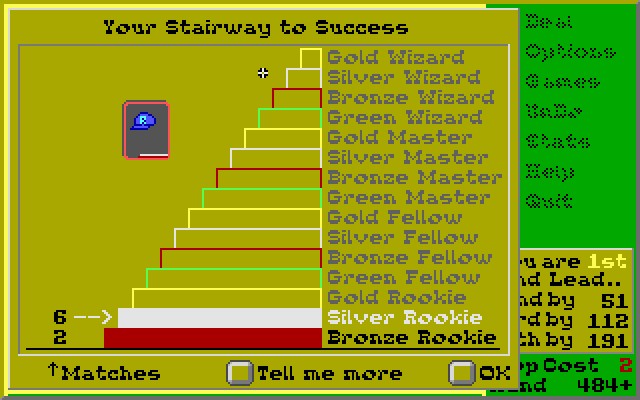
Solitaire, as the word implies, is traditionally a solo game. It is not played with other people (unless said people are hovering over your shoulder and backseat-driving). There are variations that do involve other people (one party game called "Razzle-Dazzle" does come to mind), but these tend to involve major divergences to the rules. One must be careful that games are not won solely by luck, as so many gambling games tend to be.
On the other hand, computer solitaire games tend to keep score, and so as to not make the player feel as if they've wasted their time, some such solitaire games keep running statistics, or persistent scores - the so-named "Vegas mode." Most implementations simply leave it at putting a dollar sign in front of the points counter, and some (but surprisingly, not all) will judiciously dock $52 from said counter whenever the player deals a new game. Typically, the player earns this money back in $5 increments for each card placed upon the foundations. How the $5 figure was decided upon, I couldn't say, but since its inclusion in (what else?) Windows Solitaire in 1990, it's usually the figure in use by anybody else that implements Vegas mode.

A game in progress. The player is still on the first pass of the deck, and has sent up 9 cards to the foundation. Note the "questionable" card-back, one of (I think) 6 back options.
Solitaire being Solitaire, though, Vegas mode still only includes one single player, and if one wanted to make it more competitive, the element of randomness wouldn't make it especially fair for tournament play (unless "The House always wins" is part of your motive for setting it up). Which, presumably, is where Vagabondo Enterprises came in, and decided that Solitaire needed to be "competitive" in a way that is uniquely fair and deterministic.
Klondike Pro (at one point known as Klondike Gold, or at another, RetroSol) was initially sold as shareware for MS-DOS by Brooke W. Boering and Steve A. Baker in 1996. It takes solitaire gambling to lengths never considered before (or, possibly, ever since). It presents you with a typical game of Klondike, permanently set to 3-card deal. But for each pass through the stock pile, the amount of points per "flop" increases by 1 (so the second pass costs 1 point per flop, the third pass costs 2, and so forth), so flipping through the stock pile out of desperation will probably get quite expensive. When you have finished your game (won or lost), there are 9 (simulated) opponents on the score board, who will all have to play through the exact same shuffle that you've just finished. Whether they'll win a game that you hadn't, or whether they'll choose the wrong King to put in an empty tableau and wreck their chances of scoring any points, or if they'll just give up after a single pass whether they've scored points or not, is entirely down to their play style. And to make sure that you know your opponents aren't cheating, you can watch a replay of how they played that hand. A single match runs for 6 hands of Klondike, and the game rewards the winners (and first two runners-up) with proportional amounts of gold nuggets.

There are many ranks to which you can climb; each time you do, the game tracks how many matches it took to reach that rank, and explains to you exactly how the other players' play styles have evolved. It also gives you a new hat.
A lot of this does sound like spurious technicalities, just extra steps to get more numbers on the board, but Klondike Pro keeps very detailed track of your statistics, wins, losses, and even how close your wins and losses are; it will dole out bonus nuggets if you were the only winner of a hand, or if your final score after 6 hands is very close to everybody else's, among other things that it is all too happy to explain. The inherent randomness of a game of solitaire is thwarted here, as while the shuffles are, indeed, randomized, the fact that everybody has to play the same hand brings out a completely different feel to how the game is scored. Here, just because you've won the hand, does not necessarily mean you will top the charts, as your opponents might potentially also win the hand. And just because you've lost, doesn't mean you'll lose your position on the scoreboard, as the other players might waste precious points, fruitlessly flopping through the deck. If the deal is unfair for you, it's just as unfair for everybody else, which makes sense in a twisted sort of way.
In keeping with everything else about that era of shareware software, a lot is left to the imagination. The other players do have names, like "Swiftwater Bill" and "One-Pass Penny," and accompanying portraits (just tiny black-and-white ones, that rather vainly occupy the back of their cards, should you watch any of their games), but they don't speak to you in any way, and the only indication that they have personalities is what the game explains to you when you view their profile window. The game, as it happens, is quite happy to spend 3 pages of text explaining what a "dipsy-doodle" is, and whether or not a given player knows how to perform it. Interestingly, the algorithms behind each player will "evolve" over time, as you gain ranks by winning matches. The game explains all of this, too; players will gradually change how they play, all the way up to certain opponents learning how to dipsy-doodle. The text file from which the game pulls all of this explanation is a staggering 59 kilobytes in length, almost 1,300 lines of text, and I would estimate roughly 10,000 words. Eventually, the game can run out of things to explain to you, but it will take a lot of play to get it to that point.

Each completed hand (out of 6 per match) gets played by 9 other players. On this screen you can see how many points they've earned (or lost) that hand, how many passes/flops they've taken, or click their button to watch how they played.
Overall, Klondike Pro is the kind of game that takes such ambitious strides with its own format, that the rest of the genre fails to take notice. I've never seen a single other solitaire game that has done tournaments in this way (aside from, say, Microsoft Solitaire Collection's Daily Challenges, which I'd argue are not entirely the same thing). Gaining ranks and watching the other players is oddly addictive. If you want to join in on this addiction with me, Klondike Pro was declared Freeware by its author, and can currently be downloaded (or played in-browser!) at the Internet Archive. I recommend it.